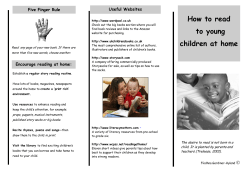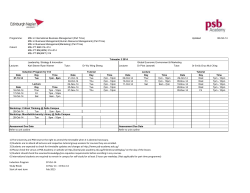
Document 384876
• The modes of critical thinking (effective reasoning) are: • Problems that cause s-l-o-w reading: #1. Poor concentration • • • • Lack of interest Daydreaming Worrying about other problems Can’t remember what is read • Problems contd: #2. Underdeveloped vocabulary • Difficult to learn new vocabulary • Not sure where to find word meanings Learning the new vocabulary for each course is essential to understanding new ideas & concept. • Problems contd: #3. Poor reading techniques: • Stuck in one gear • Takes too long to read assignment • Cannot find main points & important details • Problems contd: #4. No system for reading textbooks: SQ3R • • • • • Survey Question Read Recite Review • Problems contd: #5. The blank mind syndrome: • Eyes just passing over words • Reading without reflection 1. 2. 3. 4. 5. 6. Organize lecture & textbook notes using notecards Recite notes aloud Develop questions from notes Read questions aloud Check for accuracy Separate note-cards you know from ones you don’t know SQ3R Weaver Reading Efficiency software Ultimate Speed Reader • • • • • Survey Question Read Recite Review See handout for SQ3R study reading technique procedures. • • • • Software program Go to American Studies 206 Talk with ARC computer lab attendant for instructions Can access this program free of charge: • Mon., Wed., Fri. 10am to 5pm & 7pm to 10pm • Tues., & Thurs., after 3:00pm and evenings 7pm to 10pm Average rate = 250 wpm Good reading = speed + comprehension Some faster readers = 500 to 600 with comprehension Looking up phone number = 25,000 wpm Dictionaries, thesauri, phone directories, clearly presented material, (lists of numbered items, outlines, etc.) Newspapers, journals, novels, research Easy textbooks, newspapers, stories, magazines. Any material where only main ideas are to be learned. Generally lighter study. Most textbooks, journals & technical materials. Detailed texts: math, science, poetry, love letter; material to be studied intensively; read aloud such as drama, philosophy, religion; any material that requires deep thinking. Location of specific information About 1500 words per minute or more Reading for general topics & more ideas About 1000 words per minute or more SCANNING SKIMMING EXPLORATORY READING FOR LEARNING ANALYTICAL & CRITICAL READING General understanding of main ideas & details or relate new information to what is already known; creating interest in reading material; reading where you will be tested on details. Reading with maximum understanding of main ideas & their relationships to each other; making questions from main ideas; taking notes; material where you are responsible for recall Evaluate &/or reflect on content, to follow directions as in performing a chemistry experiment, extract precise meanings, read aloud, reading intimate material, reading for emotional stimulation. About 400 to 600 words per minute About 250 words per minute Less than 250 words per minute • Set a timer for 1 minute while you read a magazine or newspaper article. • Read to understand the material but don’t try to memorize it. • After 1 minute has passed, count the average number of words in one complete line you have just read & multiply that times the total number of lines read during that one minute. • The result will give an approximate reading speed or words per minute reading rate. Reading textbooks faster than 250 wpm increases the risk that important ideas and clarifying details will be missed. Lack of practice and trying to read and memorize information at the same time leads to problems. Increases reading speed in a variety of ways: 30 minutes Reading Warm-Ups Eye Movement skills Newspaper Reading Paced Reading Timed Reading Eye Max Game • Go to the Academic Resources Center in AMST 206. • Make an appointment to meet with the ARC reading lab attendant for quick instructions. • Dedicate at least two hours weekly • The more you practice, the quicker you will reach your goal. Students who have a reading disability or suspect that they have may have a reading disability that impacts reading/learning, should contact TRIO – Student Support Services in the Lee Building. Mrs. Teresa McLeod, Disabilities counselor. Ms. Karen Horton Coordinator, Academic Resources Center, TEC 334 One-to-one peer tutoring by appointment Supplemental Instruction (SI) Learning strengths & styles assessment Learning Enhancement Seminars Time Management Reading comprehension, vocabulary, & speed development ….. And more …...
© Copyright 2025





















